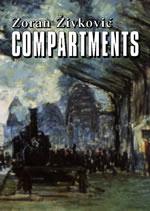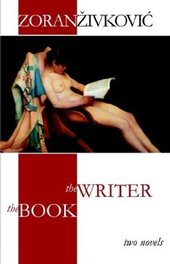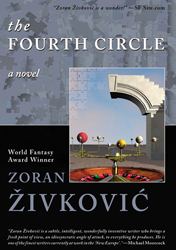 |

An Interview with Zoran Zivkovic
 by
Tamar Yellin by
Tamar Yellin
Zoran Zivkovic is the author of eleven books
of fiction and the recipient of the World Fantasy Award in 2003 for
his novella The Library.
His most recent works are Hidden Camera,
Compartments (in Postscripts #3, PS Publishing), and Four
Stories Till the End (due in Postscripts #4-7, PS Publishing).
Hidden Camera will be published by the Dalkey Archive Press later
this year and his compendium of story suites, Impossible Stories,
will appear from PS Publishing in 2006. His website can be visited at
www.zoranzivkovic.com. He
lives in Belgrade.
The following interview was conducted by email
in January 2005.

 Q:
You have said that there are only two themes in literature: love and
death. I wonder if you would care to elaborate on this with reference
to your own work? I'm thinking particularly of your novel Hidden
Camera. Q:
You have said that there are only two themes in literature: love and
death. I wonder if you would care to elaborate on this with reference
to your own work? I'm thinking particularly of your novel Hidden
Camera.
A: Paradoxically enough, there can't be Love without Death. They are
inseparable. The other side of the coin of our greatest misfortune is
our greatest fortune. No philosophical, religious or scientific system
can cope with this ultimate duality. Only Art is capable of that, and
among all the arts literature can penetrate most deeply into the greatest
and most tragic secret of being human. Basically, these two themes are
what we have been writing about for about five thousand years now, ever
since literacy was invented. And they are still very far from being
exhausted. Actually, they never will be and precisely that is the token
of the eternality of literature.
The nameless protagonist of Hidden Camera is an undertaker who
is desperately trying to find some refuge from the Death he is constantly
surrounded by. The only sanctuary, however ephemeral and fragile, for
him, as for all other mortal creatures, is Love, but Love can never
be achieved easily, as he will discover -- sometimes dramatically, sometimes
humorously, sometimes tragically -- during the most important evening
of his life. Alas, I can't elaborate more on Hidden Camera since
that would be against my principle never to explain or discuss my fiction.
Q: It seems to me that not only Love and Death, but
Art itself is one of the key recurring themes in your novels and stories.
They are almost like a continuing investigation into the mysteries of
creativity. For example, without giving too much away, Hidden Camera
itself is the story of its own creation. What do you feel you have learned
through your years as a writer about the creative process?
A: I am not sure I have learned much. But I was certainly investigating.
It was not the usual scientific investigation based on a rational approach.
Just the opposite. I let my subconscious perform its irrational magic.
Everything I have ever experienced, in the broadest sense, is permanently
stored there, including all I once had known but have inevitably forgotten
with the passing of time. My entire past is in the incessant turmoil
somewhere beneath my conscious level, in the search for possibilities
of bringing up a new quality. That is the creative mind at work, the
most subtle and precious process in the whole universe. I am in no way
in control of it, but I enjoy it no less for that. And the ultimate
challenge is to try to write about it. But again not as a scientist
who intends to explain the world. I would never try to explain the process
of artistic creativity even if that were possible. It should forever
remain in the impenetrable, but warm, soft and gentle darkness -- the
darkness that is the brightest of all...
Q: Yes: darkness does seem to be a significant element
 for
you in your creative process. (Your book, The Writer, is subtitled
"A very short novel, without chapters, about writing and darkness.")
Also sleep and dreams. Do you have a very vivid dream-life and is it
sometimes the source of your ideas? for
you in your creative process. (Your book, The Writer, is subtitled
"A very short novel, without chapters, about writing and darkness.")
Also sleep and dreams. Do you have a very vivid dream-life and is it
sometimes the source of your ideas?
A: Sometimes I have, indeed, very intense dreams. Not only visually
but acoustically and even olfactorily as well. And I remember them for
a very long time. Certain dreams I dreamt as a little boy are still
vividly with me, half a century later. But I don't think there is a
linear correlation between what I dream and what I write. It is more
complex than that. What happens occasionally is that I am suddenly awakened
by a strong impulse that may have the shape of an image from or the
first sentence of a future story. I don't rush to my computer then,
as might be expected, because I never write at any time of the day or
night except in the morning, approximately from 9 AM till noon. Instead,
I stay in my bed, half-awake, trying to figure out what new story my
subconscious is currently producing. These are rather exciting moments,
when I am closest to the very source of literary creation, in the mute
darkness of my bedroom, in that elusive no-man's-land between an active
imagination and a passive reality...
 Q:
You must have been a very imaginative little boy. Did you have any thoughts
of being a writer then? Q:
You must have been a very imaginative little boy. Did you have any thoughts
of being a writer then?
A: I was a little boy very long ago, back in the 1950s. I think that
I first wanted to be a cosmonaut, like the majority of my contemporaries,
which wasn't very surprising since at that time the first satellite
was launched. My earliest writing attempts were a real disaster. I remember
what one of my elementary school teachers prophetically told me once
after having read a piece of my homework. "You are a hopeless case,
Zoran. You will become anything but a writer..." The situation improved
slightly in my gymnasium (high school) days when I, inevitably, started
to write poetry, although my talents lay in a very different area. I
used to be a gifted mathematician and chess player. I still have a couple
of these teenage poems which were published in a school literary magazine.
I am quite aware that you would be interested in reading them. Being
a gentleman, I would have no alternative but to satisfy your justified
curiosity. Mercifully, I am protected by the linguistic barrier: the
poems are in my native Serbian...
Q: How very frustrating... However, it seems those
early talents and interests have combined with your literary -- shall
we say poetic -- abilities to create the unique flavour of your work.
On the subject of language, though, I am very interested to know: how
would you characterise your own style in Serbian? How closely does the
English translation we read approximate to your native "voice"?
A: There is a peculiar paradox about my original "voice." A Serbian
academic critic described it as "too English." I am not sure I fully
understood what he meant by that, except, maybe, that my voice sounds
somewhat discordantly in the chorus of contemporary Serbian prose. This
is the main reason, I believe, that I am mostly neglected by the official
literary establishment in my country. Although they don't deny some
of the qualities of my fiction, they rather avoid taking me seriously,
regardless of the certain degree of international success my books have
achieved. On the other hand, for a native English reader I'll always
be a foreign author whose works are more or less susceptible to being
lost in translation. I am very fortunate, however, in having an excellent
English translator, Ms. Alice Copple-Tošic, who has translated
almost all my books of fiction and managed to find my perfect English
"voice."
Q: What's more, your works have now been translated
into a range of languages including Spanish, Russian and even Korean,
in which your satirical novel about the publishing industry, The
Book, has just gone into a second edition. Does the fact that The
Book speaks to a culture so different from your own make you optimistic
or pessimistic about the future of literature?
A: Very definitely -- optimistic. But that's probably because I am
generally an optimist. Contrary to the gloomy ending of The Book,
which was only metaphorical, of course, I am quite certain that Literature
will eventually be victorious over its two latest powerful enemies:
the publishing industry and digitalization. As a sublime art form, Literature
should forever remain as elitist as possible and brought out in classic
book form. Anything else would be the betrayal of its very essence.
As for my books finding readers in foreign languages and different
cultures, I guess it's at least partly due to the fact that there are
no localisms in my prose. Readers from various parts of the world have
no problems in identifying with my nameless protagonists living in equally
nameless cities. The fundamental dilemmas my characters are faced with
are common to all human beings, regardless of their origin, religion,
gender or cultural background. Although there is no doubt that great
Literature can be made entirely of localisms, I proudly consider myself
a cosmopolitan writer...
Q: Your latest work, Four Stories Till the End,
 continues
in a satirical vein but is directed at the artistic process itself,
which is presented (albeit with an edge of humour) as a source of torment
and morbid self-destruction. Artists are encouraged to seek inspiration
by swimming in blood and being buried alive. There's a real dark side
to your artistic universe, isn't there? continues
in a satirical vein but is directed at the artistic process itself,
which is presented (albeit with an edge of humour) as a source of torment
and morbid self-destruction. Artists are encouraged to seek inspiration
by swimming in blood and being buried alive. There's a real dark side
to your artistic universe, isn't there?
A: Of course there is. My artistic universe isn't an idyllic place,
inhabited only by ideal beings. In some ways it's much more like Hell
than Heaven. But Hell mostly for the artist himself. In 'Time Gifts'
I tried to depict the infernal troubles of a writer, the diabolic limitations
of his omnipotence, the unbearable burden of his responsibilities. In
'Impossible Encounters' a writer desperately seeks refuge from the ultimate
void in what he has written. Elsewhere I played more humorously with
the controversies of the artistic process. In The Writer that
humour is subdued and discreet, intellectual; in The Book it's
mostly burlesque; in Four Stories Till the End it's exaggeratedly
satirical. It seems that throughout my artistic universe, despite its
darkness, there is one sound that prevails in its many shapes: the sound
of laughter.
Q: You make free use of the fantastic in your fiction.
Do you feel that fictional realism is inadequate to convey the full
complexity of human existence?
A: I would rather say that fictional realism is insufficient for that
purpose. It is similar to classical physics in the sense that it adequately
conveys only a part of the reality to which human existence belongs.
And not a very large part at that. The fantastic in this analogy is
similar to relativistic, or even more, to quantum physics. It opens
up entire new, huge areas of higher realities that are possible only
in the various arts. How important these areas are can be judged by
the fact that almost 90 percent of everything that has ever been created
in literature alone belongs to one or another type of the fantastic.
I found that only in the spirit of that long and fruitful tradition
could I properly express my literary being. And I am quite certain that
without the fantastic our world would be a far poorer and duller place.
Q: And yet, on the other hand, you are a rationalist?
A: There is no contradiction in it. Let me again use the analogy with
physics. When you are in the realm of classical physics (imprecisely
called "reality," because the other two kinds of physics are no less
real, only far from our everyday experience), it's only normal that
you are a rationalist. The alternative is to be irrational which is
only an euphemism for being more or less insane. But I joyfully accept
becoming irrational as soon as I step into what's the literary equivalent
of relativistic and quantum physics. It is not only normal behavior
there, but very desirable too. Without being irrational you would never
achieve anything in the art of the fantastic. As a matter of fact, the
more "insane" you are in that other realm, the better. That "insanity,"
however, should be as controlled and coherent as possible in order to
provide the best narrative results. And that is where the rational part
of the mind helps enormously. So, it is only on an intensive cooperation
of the two opposite poles, the rational and irrational, that the process
of fantastical literary creativity is properly based.
Q: That is a wonderfully coherent summary. Do you
remain confident, then, that there are always new things to be done
in literature -- that you will continue to do new things?
A: As for my humble self, the moment I realize that I have no more
new things to offer in the area of the fantastic, I'll quit writing.
That would be the wisest and most honest thing I could do. The fate
worse than death for a writer is not that she or he isn't able to write
any more, but to keep on stubbornly writing and publishing even when
it's all too evident that she or he has nothing more to say in literature.
One of the main virtues of the great literary masters was that they
knew when to stop. Fortunately, while individual authors are sadly limited
in this regard, literature itself is quite unlimited. A comparison with
physics could again be illustrative. The cosmos of literature, like
the physical cosmos we are part of, will be expanding forever. The fact
that the entity responsible for the eternal cosmic expansion is called
by physicists "dark energy" is of supreme metaphorical value in this
context. Since the source of the literary dark energy emanating from
authors' subconscious is absolutely inexhaustible, we have no reason
whatsoever to be concerned about the future of the ancient and noble
art of prose writing.

Tamar Yellin is the author of numerous short
stories whose first novel, The Genizah at the House of Shepher,
was published by The Toby Press in March 2005. Her website can be
visited at www.tamaryellin.com

© Tamar Yellin 2005.
Elsewhere in infinity plus:
Elsewhere on the web:
|
 |



